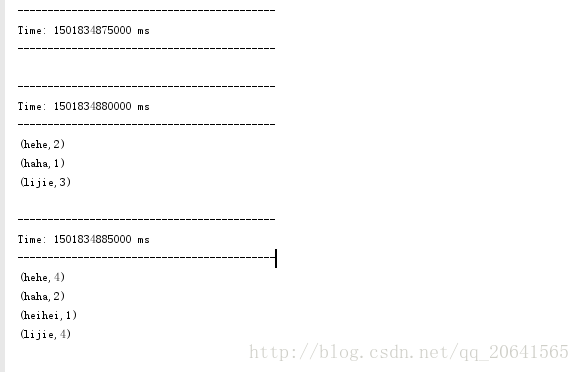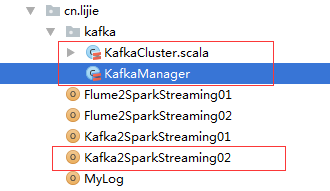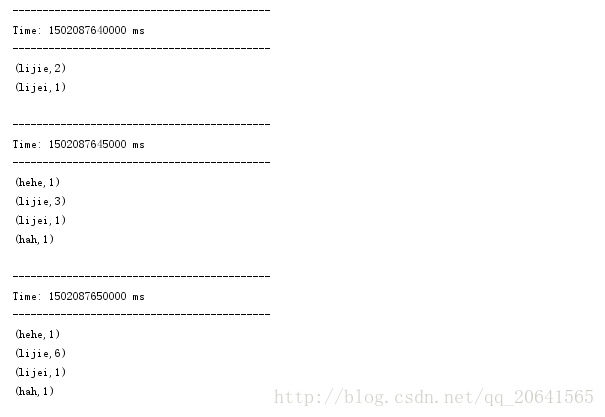Kafka到SparkStreaming的两种方式
- 1.通过Receiver,这个是个高级API,不需要自己去维护offset
主要代码:
package cn.lijie
import org.apache.log4j.Level
import org.apache.spark.streaming.kafka.KafkaUtils
import org.apache.spark.streaming.{Seconds, StreamingContext}
import org.apache.spark.{HashPartitioner, SparkConf, SparkContext}
/**
* User: lijie
* Date: 2017/8/4
* Time: 15:27
*/
object Kafka2SparkStreaming01 {
def myFunc = (it: Iterator[(String, Seq[Int], Option[Int])]) => {
it.map(x => {
(x._1, x._2.sum + x._3.getOrElse(0))
})
}
def main(args: Array[String]): Unit = {
MyLog.setLogLeavel(Level.ERROR)
val conf = new SparkConf().setAppName("k2s").setMaster("local[2]")
val sc = new SparkContext(conf)
val ssc = new StreamingContext(sc, Seconds(5))
sc.setCheckpointDir("C:\\Users\\Administrator\\Desktop\\checkpointks01")
val zk = "192.168.80.123:2181"
val groupId = "lijieGrp"
//key表示topic value表示处理线程数量
val topics = Map("lijietest001" -> 3)
//参数ssc zk groupId topics storageLevel,注意这里的topics是不可变map 习惯用可变map发现一直报错最后才发现需要用不可变map
//type Map[A, +B] = scala.collection.immutable.Map[A, B]
val ds = KafkaUtils.createStream(ssc, zk, groupId, topics)
val res = ds.map((_._2)).flatMap(_.split(" ")).map((_, 1)).updateStateByKey(myFunc, new HashPartitioner(sc.defaultParallelism), true)
res.print()
ssc.start()
ssc.awaitTermination()
}
}
启动kafka
[root@lijie kafka_2.11-0.10.1.1]# /usr/java/kafka_2.11-0.10.1.1/bin/kafka-server-start.sh -daemon ./config/server.properties创建topic
[root@lijie kafka_2.11-0.10.1.1]# /usr/java/kafka_2.11-0.10.1.1/bin/kafka-topics.sh --create --zookeeper 192.168.80.123:2181 --replication-factor 1 --partitions 3 --topic lijietest001
Created topic "lijietest001".模拟生产者
[root@lijie kafka_2.11-0.10.1.1]# /usr/java/kafka_2.11-0.10.1.1/bin/kafka-console-producer.sh --broker-list 192.168.80.123:9092 --topic lijietest001
lijie lijie lijie hehe haha hehe
hehe haha lijie hehe heihei结果
- 2.通过直连的方式直接连接kafka的broker并且自己管理offset
参考自:http://blog.csdn.net/ligt0610/article/details/47311771
其中KafkaCluster这个类是直接拷贝的源码中的org.apache.spark.streaming.kafka包下面的KafkaCluster类的内容,将里面的private[spark] 都去掉, 然后KafkaManager继承KafkaCluster
其中KafkaCluster如下:
/*
* Licensed to the Apache Software Foundation (ASF) under one or more
* contributor license agreements. See the NOTICE file distributed with
* this work for additional information regarding copyright ownership.
* The ASF licenses this file to You under the Apache License, Version 2.0
* (the "License"); you may not use this file except in compliance with
* the License. You may obtain a copy of the License at
*
* http://www.apache.org/licenses/LICENSE-2.0
*
* Unless required by applicable law or agreed to in writing, software
* distributed under the License is distributed on an "AS IS" BASIS,
* WITHOUT WARRANTIES OR CONDITIONS OF ANY KIND, either express or implied.
* See the License for the specific language governing permissions and
* limitations under the License.
*/
package cn.lijie.kafka
import java.util.Properties
import kafka.api._
import kafka.common.{ErrorMapping, OffsetAndMetadata, OffsetMetadataAndError, TopicAndPartition}
import kafka.consumer.{ConsumerConfig, SimpleConsumer}
import org.apache.spark.SparkException
import scala.collection.mutable.ArrayBuffer
import scala.util.Random
import scala.util.control.NonFatal
/**
* Convenience methods for interacting with a Kafka cluster.
*
* @param kafkaParams Kafka
* configuration parameters.
* Requires "metadata.broker.list" or "bootstrap.servers" to be set with Kafka broker(s),
* NOT zookeeper servers, specified in host1:port1,host2:port2 form
*/
class KafkaCluster(val kafkaParams: Map[String, String]) extends Serializable {
import KafkaCluster.{Err, LeaderOffset, SimpleConsumerConfig}
// ConsumerConfig isn't serializable
@transient var _config: SimpleConsumerConfig = null
def config: SimpleConsumerConfig = this.synchronized {
if (_config == null) {
_config = SimpleConsumerConfig(kafkaParams)
}
_config
}
def connect(host: String, port: Int): SimpleConsumer =
new SimpleConsumer(host, port, config.socketTimeoutMs,
config.socketReceiveBufferBytes, config.clientId)
def connectLeader(topic: String, partition: Int): Either[Err, SimpleConsumer] =
findLeader(topic, partition).right.map(hp => connect(hp._1, hp._2))
// Metadata api
// scalastyle:off
// https://cwiki.apache.org/confluence/display/KAFKA/A+Guide+To+The+Kafka+Protocol#AGuideToTheKafkaProtocol-MetadataAPI
// scalastyle:on
def findLeader(topic: String, partition: Int): Either[Err, (String, Int)] = {
val req = TopicMetadataRequest(TopicMetadataRequest.CurrentVersion,
0, config.clientId, Seq(topic))
val errs = new Err
withBrokers(Random.shuffle(config.seedBrokers), errs) { consumer =>
val resp: TopicMetadataResponse = consumer.send(req)
resp.topicsMetadata.find(_.topic == topic).flatMap { tm: TopicMetadata =>
tm.partitionsMetadata.find(_.partitionId == partition)
}.foreach { pm: PartitionMetadata =>
pm.leader.foreach { leader =>
return Right((leader.host, leader.port))
}
}
}
Left(errs)
}
def findLeaders(
topicAndPartitions: Set[TopicAndPartition]
): Either[Err, Map[TopicAndPartition, (String, Int)]] = {
val topics = topicAndPartitions.map(_.topic)
val response = getPartitionMetadata(topics).right
val answer = response.flatMap { tms: Set[TopicMetadata] =>
val leaderMap = tms.flatMap { tm: TopicMetadata =>
tm.partitionsMetadata.flatMap { pm: PartitionMetadata =>
val tp = TopicAndPartition(tm.topic, pm.partitionId)
if (topicAndPartitions(tp)) {
pm.leader.map { l =>
tp -> (l.host -> l.port)
}
} else {
None
}
}
}.toMap
if (leaderMap.keys.size == topicAndPartitions.size) {
Right(leaderMap)
} else {
val missing = topicAndPartitions.diff(leaderMap.keySet)
val err = new Err
err.append(new SparkException(s"Couldn't find leaders for ${missing}"))
Left(err)
}
}
answer
}
def getPartitions(topics: Set[String]): Either[Err, Set[TopicAndPartition]] = {
getPartitionMetadata(topics).right.map { r =>
r.flatMap { tm: TopicMetadata =>
tm.partitionsMetadata.map { pm: PartitionMetadata =>
TopicAndPartition(tm.topic, pm.partitionId)
}
}
}
}
def getPartitionMetadata(topics: Set[String]): Either[Err, Set[TopicMetadata]] = {
val req = TopicMetadataRequest(
TopicMetadataRequest.CurrentVersion, 0, config.clientId, topics.toSeq)
val errs = new Err
withBrokers(Random.shuffle(config.seedBrokers), errs) { consumer =>
val resp: TopicMetadataResponse = consumer.send(req)
val respErrs = resp.topicsMetadata.filter(m => m.errorCode != ErrorMapping.NoError)
if (respErrs.isEmpty) {
return Right(resp.topicsMetadata.toSet)
} else {
respErrs.foreach { m =>
val cause = ErrorMapping.exceptionFor(m.errorCode)
val msg = s"Error getting partition metadata for '${m.topic}'. Does the topic exist?"
errs.append(new SparkException(msg, cause))
}
}
}
Left(errs)
}
// Leader offset api
// scalastyle:off
// https://cwiki.apache.org/confluence/display/KAFKA/A+Guide+To+The+Kafka+Protocol#AGuideToTheKafkaProtocol-OffsetAPI
// scalastyle:on
def getLatestLeaderOffsets(
topicAndPartitions: Set[TopicAndPartition]
): Either[Err, Map[TopicAndPartition, LeaderOffset]] =
getLeaderOffsets(topicAndPartitions, OffsetRequest.LatestTime)
def getEarliestLeaderOffsets(
topicAndPartitions: Set[TopicAndPartition]
): Either[Err, Map[TopicAndPartition, LeaderOffset]] =
getLeaderOffsets(topicAndPartitions, OffsetRequest.EarliestTime)
def getLeaderOffsets(
topicAndPartitions: Set[TopicAndPartition],
before: Long
): Either[Err, Map[TopicAndPartition, LeaderOffset]] = {
getLeaderOffsets(topicAndPartitions, before, 1).right.map { r =>
r.map { kv =>
// mapValues isnt serializable, see SI-7005
kv._1 -> kv._2.head
}
}
}
def flip[K, V](m: Map[K, V]): Map[V, Seq[K]] =
m.groupBy(_._2).map { kv =>
kv._1 -> kv._2.keys.toSeq
}
def getLeaderOffsets(
topicAndPartitions: Set[TopicAndPartition],
before: Long,
maxNumOffsets: Int
): Either[Err, Map[TopicAndPartition, Seq[LeaderOffset]]] = {
findLeaders(topicAndPartitions).right.flatMap { tpToLeader =>
val leaderToTp: Map[(String, Int), Seq[TopicAndPartition]] = flip(tpToLeader)
val leaders = leaderToTp.keys
var result = Map[TopicAndPartition, Seq[LeaderOffset]]()
val errs = new Err
withBrokers(leaders, errs) { consumer =>
val partitionsToGetOffsets: Seq[TopicAndPartition] =
leaderToTp((consumer.host, consumer.port))
val reqMap = partitionsToGetOffsets.map { tp: TopicAndPartition =>
tp -> PartitionOffsetRequestInfo(before, maxNumOffsets)
}.toMap
val req = OffsetRequest(reqMap)
val resp = consumer.getOffsetsBefore(req)
val respMap = resp.partitionErrorAndOffsets
partitionsToGetOffsets.foreach { tp: TopicAndPartition =>
respMap.get(tp).foreach { por: PartitionOffsetsResponse =>
if (por.error == ErrorMapping.NoError) {
if (por.offsets.nonEmpty) {
result += tp -> por.offsets.map { off =>
LeaderOffset(consumer.host, consumer.port, off)
}
} else {
errs.append(new SparkException(
s"Empty offsets for ${tp}, is ${before} before log beginning?"))
}
} else {
errs.append(ErrorMapping.exceptionFor(por.error))
}
}
}
if (result.keys.size == topicAndPartitions.size) {
return Right(result)
}
}
val missing = topicAndPartitions.diff(result.keySet)
errs.append(new SparkException(s"Couldn't find leader offsets for ${missing}"))
Left(errs)
}
}
// Consumer offset api
// scalastyle:off
// https://cwiki.apache.org/confluence/display/KAFKA/A+Guide+To+The+Kafka+Protocol#AGuideToTheKafkaProtocol-OffsetCommit/FetchAPI
// scalastyle:on
// this 0 here indicates api version, in this case the original ZK backed api.
def defaultConsumerApiVersion: Short = 0
/** Requires Kafka >= 0.8.1.1 */
def getConsumerOffsets(
groupId: String,
topicAndPartitions: Set[TopicAndPartition]
): Either[Err, Map[TopicAndPartition, Long]] =
getConsumerOffsets(groupId, topicAndPartitions, defaultConsumerApiVersion)
def getConsumerOffsets(
groupId: String,
topicAndPartitions: Set[TopicAndPartition],
consumerApiVersion: Short
): Either[Err, Map[TopicAndPartition, Long]] = {
getConsumerOffsetMetadata(groupId, topicAndPartitions, consumerApiVersion).right.map { r =>
r.map { kv =>
kv._1 -> kv._2.offset
}
}
}
/** Requires Kafka >= 0.8.1.1 */
def getConsumerOffsetMetadata(
groupId: String,
topicAndPartitions: Set[TopicAndPartition]
): Either[Err, Map[TopicAndPartition, OffsetMetadataAndError]] =
getConsumerOffsetMetadata(groupId, topicAndPartitions, defaultConsumerApiVersion)
def getConsumerOffsetMetadata(
groupId: String,
topicAndPartitions: Set[TopicAndPartition],
consumerApiVersion: Short
): Either[Err, Map[TopicAndPartition, OffsetMetadataAndError]] = {
var result = Map[TopicAndPartition, OffsetMetadataAndError]()
val req = OffsetFetchRequest(groupId, topicAndPartitions.toSeq, consumerApiVersion)
val errs = new Err
withBrokers(Random.shuffle(config.seedBrokers), errs) { consumer =>
val resp = consumer.fetchOffsets(req)
val respMap = resp.requestInfo
val needed = topicAndPartitions.diff(result.keySet)
needed.foreach { tp: TopicAndPartition =>
respMap.get(tp).foreach { ome: OffsetMetadataAndError =>
if (ome.error == ErrorMapping.NoError) {
result += tp -> ome
} else {
errs.append(ErrorMapping.exceptionFor(ome.error))
}
}
}
if (result.keys.size == topicAndPartitions.size) {
return Right(result)
}
}
val missing = topicAndPartitions.diff(result.keySet)
errs.append(new SparkException(s"Couldn't find consumer offsets for ${missing}"))
Left(errs)
}
/** Requires Kafka >= 0.8.1.1 */
def setConsumerOffsets(
groupId: String,
offsets: Map[TopicAndPartition, Long]
): Either[Err, Map[TopicAndPartition, Short]] =
setConsumerOffsets(groupId, offsets, defaultConsumerApiVersion)
def setConsumerOffsets(
groupId: String,
offsets: Map[TopicAndPartition, Long],
consumerApiVersion: Short
): Either[Err, Map[TopicAndPartition, Short]] = {
val meta = offsets.map { kv =>
kv._1 -> OffsetAndMetadata(kv._2)
}
setConsumerOffsetMetadata(groupId, meta, consumerApiVersion)
}
/** Requires Kafka >= 0.8.1.1 */
def setConsumerOffsetMetadata(
groupId: String,
metadata: Map[TopicAndPartition, OffsetAndMetadata]
): Either[Err, Map[TopicAndPartition, Short]] =
setConsumerOffsetMetadata(groupId, metadata, defaultConsumerApiVersion)
def setConsumerOffsetMetadata(
groupId: String,
metadata: Map[TopicAndPartition, OffsetAndMetadata],
consumerApiVersion: Short
): Either[Err, Map[TopicAndPartition, Short]] = {
var result = Map[TopicAndPartition, Short]()
val req = OffsetCommitRequest(groupId, metadata, consumerApiVersion)
val errs = new Err
val topicAndPartitions = metadata.keySet
withBrokers(Random.shuffle(config.seedBrokers), errs) { consumer =>
val resp = consumer.commitOffsets(req)
val respMap = resp.commitStatus
val needed = topicAndPartitions.diff(result.keySet)
needed.foreach { tp: TopicAndPartition =>
respMap.get(tp).foreach { err: Short =>
if (err == ErrorMapping.NoError) {
result += tp -> err
} else {
errs.append(ErrorMapping.exceptionFor(err))
}
}
}
if (result.keys.size == topicAndPartitions.size) {
return Right(result)
}
}
val missing = topicAndPartitions.diff(result.keySet)
errs.append(new SparkException(s"Couldn't set offsets for ${missing}"))
Left(errs)
}
// Try a call against potentially multiple brokers, accumulating errors
def withBrokers(brokers: Iterable[(String, Int)], errs: Err)
(fn: SimpleConsumer => Any): Unit = {
brokers.foreach { hp =>
var consumer: SimpleConsumer = null
try {
consumer = connect(hp._1, hp._2)
fn(consumer)
} catch {
case NonFatal(e) =>
errs.append(e)
} finally {
if (consumer != null) {
consumer.close()
}
}
}
}
}
object KafkaCluster {
type Err = ArrayBuffer[Throwable]
/** If the result is right, return it, otherwise throw SparkException */
def checkErrors[T](result: Either[Err, T]): T = {
result.fold(
errs => throw new SparkException(errs.mkString("\n")),
ok => ok
)
}
case class LeaderOffset(host: String, port: Int, offset: Long)
/**
* High-level kafka consumers connect to ZK. ConsumerConfig assumes this use case.
* Simple consumers connect directly to brokers, but need many of the same configs.
* This subclass won't warn about missing ZK params, or presence of broker params.
*/
class SimpleConsumerConfig(brokers: String, originalProps: Properties)
extends ConsumerConfig(originalProps) {
val seedBrokers: Array[(String, Int)] = brokers.split(",").map { hp =>
val hpa = hp.split(":")
if (hpa.size == 1) {
throw new SparkException(s"Broker not in the correct format of : [$brokers]" )
}
(hpa(0), hpa(1).toInt)
}
}
object SimpleConsumerConfig {
/**
* Make a consumer config without requiring group.id or zookeeper.connect,
* since communicating with brokers also needs common settings such as timeout
*/
def apply(kafkaParams: Map[String, String]): SimpleConsumerConfig = {
// These keys are from other pre-existing kafka configs for specifying brokers, accept either
val brokers = kafkaParams.get("metadata.broker.list")
.orElse(kafkaParams.get("bootstrap.servers"))
.getOrElse(throw new SparkException(
"Must specify metadata.broker.list or bootstrap.servers"))
val props = new Properties()
kafkaParams.foreach { case (key, value) =>
// prevent warnings on parameters ConsumerConfig doesn't know about
if (key != "metadata.broker.list" && key != "bootstrap.servers") {
props.put(key, value)
}
}
Seq("zookeeper.connect", "group.id").foreach { s =>
if (!props.containsKey(s)) {
props.setProperty(s, "")
}
}
new SimpleConsumerConfig(brokers, props)
}
}
}
KafkaManager如下:
package cn.lijie.kafka
import cn.lijie.kafka.KafkaCluster.LeaderOffset
import kafka.common.TopicAndPartition
import kafka.message.MessageAndMetadata
import kafka.serializer.Decoder
import org.apache.spark.SparkException
import org.apache.spark.rdd.RDD
import org.apache.spark.streaming.StreamingContext
import org.apache.spark.streaming.dstream.InputDStream
import org.apache.spark.streaming.kafka.{HasOffsetRanges, KafkaUtils}
import scala.reflect.ClassTag
/**
* Created by knowpigxia on 15-8-5.
*/
class KafkaManager(val kafkaParams: Map[String, String]) extends Serializable {
private val kc = new KafkaCluster(kafkaParams)
/**
* 创建数据流
*
* @param ssc
* @param kafkaParams
* @param topics
* @tparam K
* @tparam V
* @tparam KD
* @tparam VD
* @return
*/
def createDirectStream[K: ClassTag, V: ClassTag, KD <: Decoder[K] : ClassTag, VD <: Decoder[V] : ClassTag](
ssc: StreamingContext, kafkaParams: Map[String, String], topics: Set[String]): InputDStream[(K, V)] = {
val groupId = kafkaParams.get("group.id").get
// 在zookeeper上读取offsets前先根据实际情况更新offsets
setOrUpdateOffsets(topics, groupId)
//从zookeeper上读取offset开始消费message
val messages = {
val partitionsE = kc.getPartitions(topics)
if (partitionsE.isLeft)
throw new SparkException(s"get kafka partition failed: ${partitionsE.left.get}")
val partitions = partitionsE.right.get
val consumerOffsetsE = kc.getConsumerOffsets(groupId, partitions)
if (consumerOffsetsE.isLeft)
throw new SparkException(s"get kafka consumer offsets failed: ${consumerOffsetsE.left.get}")
val consumerOffsets = consumerOffsetsE.right.get
KafkaUtils.createDirectStream[K, V, KD, VD, (K, V)](
ssc, kafkaParams, consumerOffsets, (mmd: MessageAndMetadata[K, V]) => (mmd.key, mmd.message))
}
messages
}
/**
* 创建数据流前,根据实际消费情况更新消费offsets
*
* @param topics
* @param groupId
*/
private def setOrUpdateOffsets(topics: Set[String], groupId: String): Unit = {
topics.foreach(topic => {
var hasConsumed = true
val partitionsE = kc.getPartitions(Set(topic))
if (partitionsE.isLeft)
throw new SparkException(s"get kafka partition failed: ${partitionsE.left.get}")
val partitions = partitionsE.right.get
val consumerOffsetsE = kc.getConsumerOffsets(groupId, partitions)
if (consumerOffsetsE.isLeft) hasConsumed = false
if (hasConsumed) {
// 消费过
/**
* 如果streaming程序执行的时候出现kafka.common.OffsetOutOfRangeException,
* 说明zk上保存的offsets已经过时了,即kafka的定时清理策略已经将包含该offsets的文件删除。
* 针对这种情况,只要判断一下zk上的consumerOffsets和earliestLeaderOffsets的大小,
* 如果consumerOffsets比earliestLeaderOffsets还小的话,说明consumerOffsets已过时,
* 这时把consumerOffsets更新为earliestLeaderOffsets
*/
val earliestLeaderOffsetsE = kc.getEarliestLeaderOffsets(partitions)
if (earliestLeaderOffsetsE.isLeft)
throw new SparkException(s"get earliest leader offsets failed: ${earliestLeaderOffsetsE.left.get}")
val earliestLeaderOffsets = earliestLeaderOffsetsE.right.get
val consumerOffsets = consumerOffsetsE.right.get
// 可能只是存在部分分区consumerOffsets过时,所以只更新过时分区的consumerOffsets为earliestLeaderOffsets
var offsets: Map[TopicAndPartition, Long] = Map()
consumerOffsets.foreach({ case (tp, n) =>
val earliestLeaderOffset = earliestLeaderOffsets(tp).offset
if (n < earliestLeaderOffset) {
println("consumer group:" + groupId + ",topic:" + tp.topic + ",partition:" + tp.partition +
" offsets已经过时,更新为" + earliestLeaderOffset)
offsets += (tp -> earliestLeaderOffset)
}
})
if (!offsets.isEmpty) {
kc.setConsumerOffsets(groupId, offsets)
}
} else {
// 没有消费过
val reset = kafkaParams.get("auto.offset.reset").map(_.toLowerCase)
var leaderOffsets: Map[TopicAndPartition, LeaderOffset] = null
if (reset == Some("smallest")) {
val leaderOffsetsE = kc.getEarliestLeaderOffsets(partitions)
if (leaderOffsetsE.isLeft)
throw new SparkException(s"get earliest leader offsets failed: ${leaderOffsetsE.left.get}")
leaderOffsets = leaderOffsetsE.right.get
} else {
val leaderOffsetsE = kc.getLatestLeaderOffsets(partitions)
if (leaderOffsetsE.isLeft)
throw new SparkException(s"get latest leader offsets failed: ${leaderOffsetsE.left.get}")
leaderOffsets = leaderOffsetsE.right.get
}
val offsets = leaderOffsets.map {
case (tp, offset) => (tp, offset.offset)
}
kc.setConsumerOffsets(groupId, offsets)
}
})
}
/**
* 更新zookeeper上的消费offsets
*
* @param rdd
*/
def updateZKOffsets(rdd: RDD[(String, String)]): Unit = {
val groupId = kafkaParams.get("group.id").get
val offsetsList = rdd.asInstanceOf[HasOffsetRanges].offsetRanges
for (offsets <- offsetsList) {
val topicAndPartition = TopicAndPartition(offsets.topic, offsets.partition)
val o = kc.setConsumerOffsets(groupId, Map((topicAndPartition, offsets.untilOffset)))
if (o.isLeft) {
println(s"Error updating the offset to Kafka cluster: ${o.left.get}")
}
}
}
} Kafka2SparkStreaming02如下:
import cn.lijie.MyLog
import cn.lijie.kafka.KafkaManager
import kafka.serializer.StringDecoder
import org.apache.log4j.Level
import org.apache.spark.streaming.{Seconds, StreamingContext}
import org.apache.spark.{HashPartitioner, SparkConf, SparkContext}
object Kafka2SparkStreaming02 {
def myFunc = (it: Iterator[(String, Seq[Int], Option[Int])]) => {
it.map(x => {
(x._1, x._2.sum + x._3.getOrElse(0))
})
}
def main(args: Array[String]) {
MyLog.setLogLeavel(Level.WARN)
val brokers = "192.168.80.123:9092"
val topics = "lijietest001"
val groupId = "groupId"
val sparkConf = new SparkConf().setAppName("Direct").setMaster("local[2]")
val sc = new SparkContext(sparkConf)
sparkConf.set("spark.streaming.kafka.maxRatePerPartition", "5")
sparkConf.set("spark.serializer", "org.apache.spark.serializer.KryoSerializer")
val ssc = new StreamingContext(sc, Seconds(5))
sc.setCheckpointDir("C:\\Users\\Administrator\\Desktop\\checkpointks02")
val topicsSet = topics.split(",").toSet
val kafkaParams = Map[String, String](
"metadata.broker.list" -> brokers,
"group.id" -> groupId,
"auto.offset.reset" -> "smallest"
)
val km = new KafkaManager(kafkaParams)
val messages = km.createDirectStream[String, String, StringDecoder, StringDecoder](
ssc, kafkaParams, topicsSet)
val ds = messages.map((_._2)).flatMap(_.split(" ")).map((_, 1)).updateStateByKey(myFunc, new HashPartitioner(sc.defaultParallelism), true)
//保存offset
messages.foreachRDD(rdd => {
km.updateZKOffsets(rdd)
})
ds.print()
ssc.start()
ssc.awaitTermination()
}
} 启动程序并且在kafka生产者端生产数据,结果如下:


